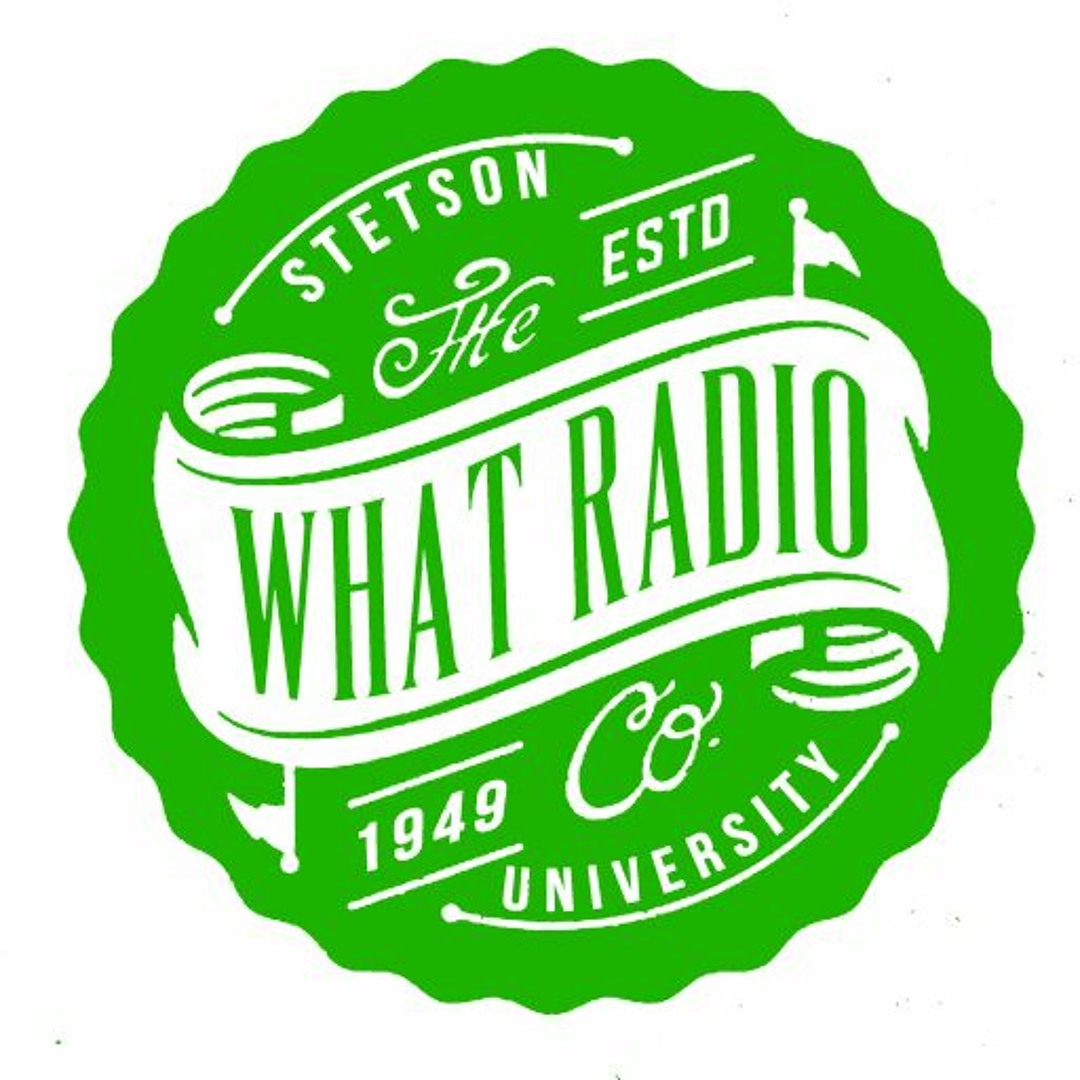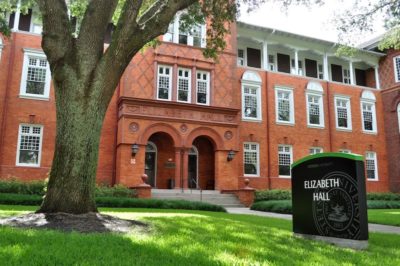“I practice all the time. That’s all I do. And when I have free time, it’s like, what do I do? I have no idea.” These words from Alexander Ortiz Vélez ’24 completely align with the perception of music students on Stetson’s campus. Just ask any group of students lounging around the CUB which majors are the busiest. They’ll throw out a few of their own majors before someone inevitably mentions music students.
I sat down with five students from the Stetson School of Music along with a faculty member and the Dean of the School of Music, Dean Washington Garcia, to get a fuller picture of the music student experience at Stetson University.
Student Workload
I began questioning each student by asking them to describe their workload and challenging them to explain the busy music student trope. This question really broke the ice, and a few students even laughed through their answers.
“So I think it’s pretty hefty. I think more than even workload I consider it almost like a lifestyle,” said Vélez, who is well into his senior year as an Organ Performance major.
Alex Fisher ’26, a Vocal Music Education major said frankly, “Pretty insane. I think I’m taking 11 classes right now.”
John Wiese ’27, a Violin Performance and Music Composition major, credited his personal circumstance for the weight of his workload, calling it “incredibly overwhelming” saying that it was “due in part to the double major, and the amount of stuff that I do outside of my classes.”
Emma Floyd ’26, a Music Education major, mused on the structure of the classes, adding, “All the classes kind of coexist within each other. And so it’s just a constant cycle that’s never ending.”
Zero Credit Courses
One topic that came up in multiple interviews was the zero-credit classes that music students are often required to take. Several degree requirements for music students weigh in at zero credits, such as MUSC 252 Composition Seminar, which despite being a zero credit class meets for 50 minutes once a week.
When breaking down the specifics of her schedule, Floyd spoke on the credits of the classes on her schedule, saying, “a lot of them end up being zero credit classes, which is frustrating, but it is what it is.”
Vélez referred to these shorter classes as “tiny little nuggets of time,” which could be stressful to manage and spend the in-between time efficiently.
Financial Pressures
Multiple interviewees also referenced the financial stressors of being a music major during our interviews.
Fisher emphasized their desire for the School of Music to provide more opportunities for financial aid precisely due to the difficulty that comes with holding a job as a music student. “Since we’re doing so much within that building [Presser], in terms of hours within the week, I feel like it’s unrealistic to expect people to be able to get jobs.”
Alumni Evan Hernandez ’23 more specifically added, “I did end up having to take a loan my senior year, I didn’t lose any scholarships; I came here with full tuition. But obviously, tuition keeps going up and up and up.” Even students with full tuition scholarships face this dilemma at Stetson. As tuition rises, those scholarships often don’t rise alongside the price. Students who chose Stetson under the premise of a full ride can find themselves scrambling to fill the gaps with unexpected debt, especially when degree requirements make employment a particular challenge.
Other financial stressors within the School of Music came up during interviews.
“Well, you of course, have to buy your own instrument. And if you’re not expecting that, you know, coming out of high school and being like oh, my gosh, my instrument’s not good enough I can’t keep up with these people,” Hernendez added.
Particularly for vocalists, Floyd mentioned, “We have to pay for someone to play the piano for us and we have to meet with them once a week. We have to bring them to our lessons once a week. Then we have studio rehearsals and we have actual recitals. So it adds up. And that has to come out of our own pockets. So yeah, there is a financial stress there.”
The Faculty Perspective
I also sat down with Dr. Zavlunov, Associate Professor of Music History, to ask about the faculty perspective on the School of Music’s reputation for having busy students. When asked about what contributes to the stereotype of the busy music student he had two explanations.
First, “The School of Music curriculum, in some ways, is the most complicated of any program within this institution, Stetson, as a whole.”
Second, “The students in the school of music are involved in different kinds of musical activities, right? There’s classroom activities, there’s chamber music activities, there’s studio lessons, and then there’s large ensembles, right, and they have to juggle all of these things.”
Getting down to specifics, Dr. Zavlunov points to these stressors as originating more from the discipline of music rather than the Stetson School of Music specifically, stating, “It is not unique to Stetson, by any means. It is very common for the Schools of Music, this level of engagement, kind of continuous engagement, daily engagement is part of the discipline of music.”
Dr. Zavlunov pointed out that even the stressful parts of the Stetson School of Music structure are part of what makes Stetson so particularly great. He zeroed in on the high-level of training that students receive while also existing within a liberal arts institution, explaining, “They have to balance both the rigorous classroom experience with professional training. That’s what makes this program with its 12 majors, both so challenging in some respects, but also so unique and exciting.”
Positives
While everyone interviewed had their share of stress and busyness, each interviewee also went out of their way to emphasize that they love what they do and love Stetson’s School of Music.
Fisher emphasized the warmth of students and faculty, noting, “Stetson really has it together with the camaraderie that like we, as faculty and students have together.”
“Dr. Washington Garcia, is incredibly, incredibly supportive of our individual efforts,” pointed out Wiese, who shared that Dr. Washington Garcia has been encouraging about setting up projects to bring Wiese’s own personal goals and ideas into fruition.
Dean Washington Garcia, who came to Stetson in 2021, took the time to sit down with me and speak about the environment that Stetson’s School of Music aims to have through some of the initiatives that he’s taken on during his time here so far.
“We have continued to strengthen and focus even more on providing opportunities for students for experiential learning opportunities, as well as professional development opportunities. ”
Speaking on his love for Stetson’s School of Music, he got into specifics, stating, “I love the fact that we are a very relationship rich environment, the School of Music.”
When it got to the tough questions about the stereotype of the busy music student, Dean Washington Garcia wanted to emphasize that he is open to listening to student concerns. One avenue that he highlighted through which he gets the opportunity to hear about student issues is the School of Music Student Advisory Council.
“I meet with the student advisory council regularly or sometimes every week, but at least every other week.”
He added a specific example of how a conversation with the student advisory council can lead to action. “Last year, for example, there were some concerns about the practice rooms, we addressed the practice rooms.”
Dean Washington Garcia wants students to know that he is here to support them, adding, “I’ve tried to make myself as available as I can to be able to connect with the students on a one on one. To make sure that they know that I’m here to support them.”
Student Suggestions
Whether on the student advisory council or not, the students that I spoke with were not shy about pointing to constructive changes they would like to see from the School of Music.
“Oh, I think a lot more attention to self care,” said Vélez who pointed out that the busyness of life as a music student can lead to confusion and poor self care habits, especially post-graduation when alumni may find themselves with more free time than they know how to manage. He also added, “some of the classes I believe could be joined and not make it so separate from each other.” Doing so could possibly address the scheduling issue with all these ‘nuggets of time’ as he referred to them.
Hernandez cheekily leaned into the microphone as she said, “I hope that with the $15 million they raised this year, they will help people out with scholarships and more travel opportunities, because those are really good.”
“I think there should be some built in finances for pianists,” said Floyd, building on her frustration with the finances coming out of student pockets. She also added that while the student counseling center is certainly a resource, “I kind of wish there would be more like music student oriented counselors, just people who really get it.” She explained that since the music world is sometimes a culture of its own, there are gaps that exist when speaking to the general counselors.
Wrap Up
At the end of the day, Stetson’s School of Music is undeniably impressive and draws a high caliber of students who strive to achieve great things. I think that Alex Fisher summed it up best when they put the music student so aptly-
“I feel extremely privileged to be here, which is why I’m willing to hustle and work 15 hours while also taking 11 classes.”



























